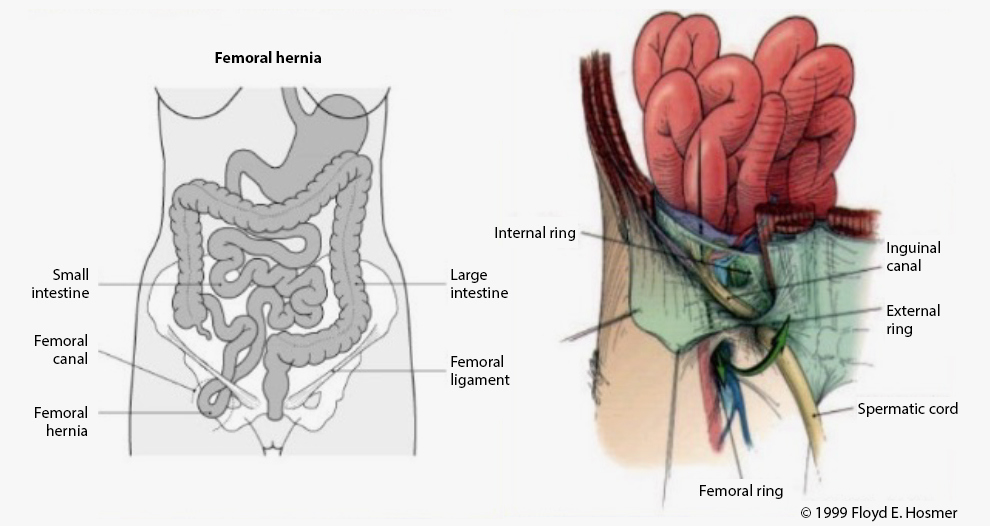What is a femoral hernia?
Your muscles are usually strong enough to keep your intestines and organs in their proper place. Sometimes, however, your intra-abdominal tissues can be pushed through a weakened spot in your muscle when you overstrain. If a portion of tissue pushes through the wall of the femoral canal, it’s called a femoral hernia. A femoral hernia will appear as a bulge near the groin or thigh. The femoral canal houses the femoral artery, smaller veins, and nerves. It’s located just below the inguinal ligament in the groin.
A femoral hernia can also be called a femorocele.
Women are more likely than men to suffer from a femoral hernia. Overall, femoral hernias are not common. Most hernias that affect the groin are inguinal hernias, and fewer than 3 percent of all hernias are femoral. Misleading femoral hernias more likely to incarcerate than inguinal. However, they can occasionally lead to severe problems if the hernia obstructs and blocks blood flow to your intestines. This is called a strangulated hernia — it’s a medical emergency and requires immediate surgery.

What causes a femoral hernia?
The exact cause of femoral and other hernias are unknown most of the time. You may be born with a weakened area of the femoral canal, or the area may become weak over time.
Certain conditions can contribute to the weakening of the muscle walls and those include:
- Childbirth
- Chronic constipation
- Heavy lifting
- Being overweight
- Difficult urinationdue to an enlarged prostate
- Chronic coughing
How can a femoral hernia be treated?
Surgical hernia repair are often performed under general anaesthesia however in certain circumstances local / regional anaesthesia may be used. This means you will be asleep for the procedure and unable to feel pain. Femoral hernia repair can be done as either an open or laparoscopic surgery. An open procedure requires a larger incision and therefore a slightly longer recovery period.
Laparoscopic surgery uses three to four keyhole-sized incisions that minimize loss of blood. The type of surgery chosen depends on factors, including:
- The fitness of the patient
- The difficulty of the procedure
Femoral hernias are often asymptomatic, however due to their high risk of causing problems (e.g. incarceration, strangulation or obstruction) your surgeons will often advise surgical repair.
In both surgeries, your surgeon will make incisions in your groin area to access the hernia. The intestine or other tissue protruding from the femoral area is returned to its proper position. The surgeon will sew the hole back together and may reinforce it with a piece of mesh. The mesh strengthens the wall of the canal.
How long will it take to recover?
You should be able to go home on the day of, or the day after, your operation. Get an adult to take you home in a car or taxi and follow any instructions you're given by the hospital.
After the operation, your groin will feel sore and uncomfortable. You'll be given painkillers to help relieve this discomfort.
We advise no heavy lifting or vigorous exercise for 6 weeks. However most people find they can resume most non strenuous activities after 2 weeks.
Once you have had your operation with Mr Lingam depending on the type of hernia. He will give you information about the most suitable type of hernia repair you need.
Contact us
Should you wish to consult Mr Lingam about your hernia, please send an email to mklingam.sec@gmail.com or call:
Derby Nuffield on 01332 540100
Derby Private Suite on 01332 786128
Mr Lingam consults at the Derby Nuffield on Tuesday AM, Wednesday and Friday PM and at Derby Private Suite on a Thursday PM.
